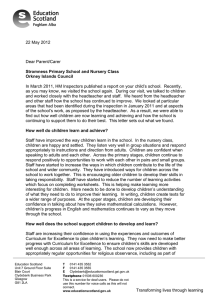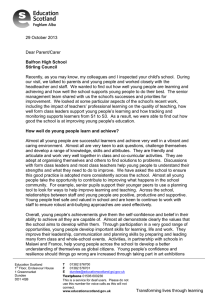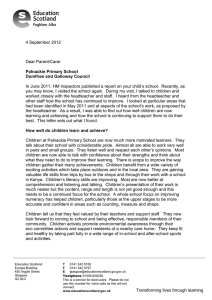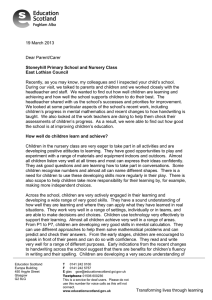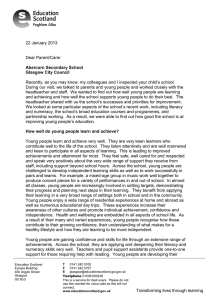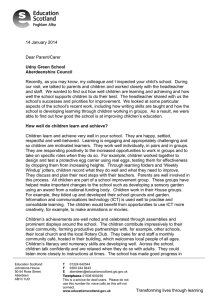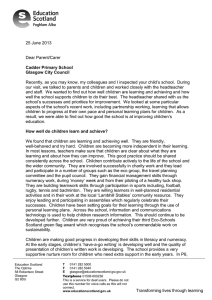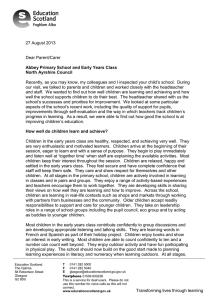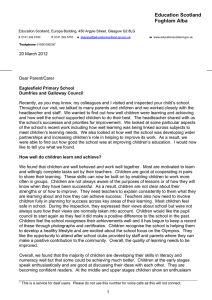19 June 2012 Dear Parent/Carer
advertisement
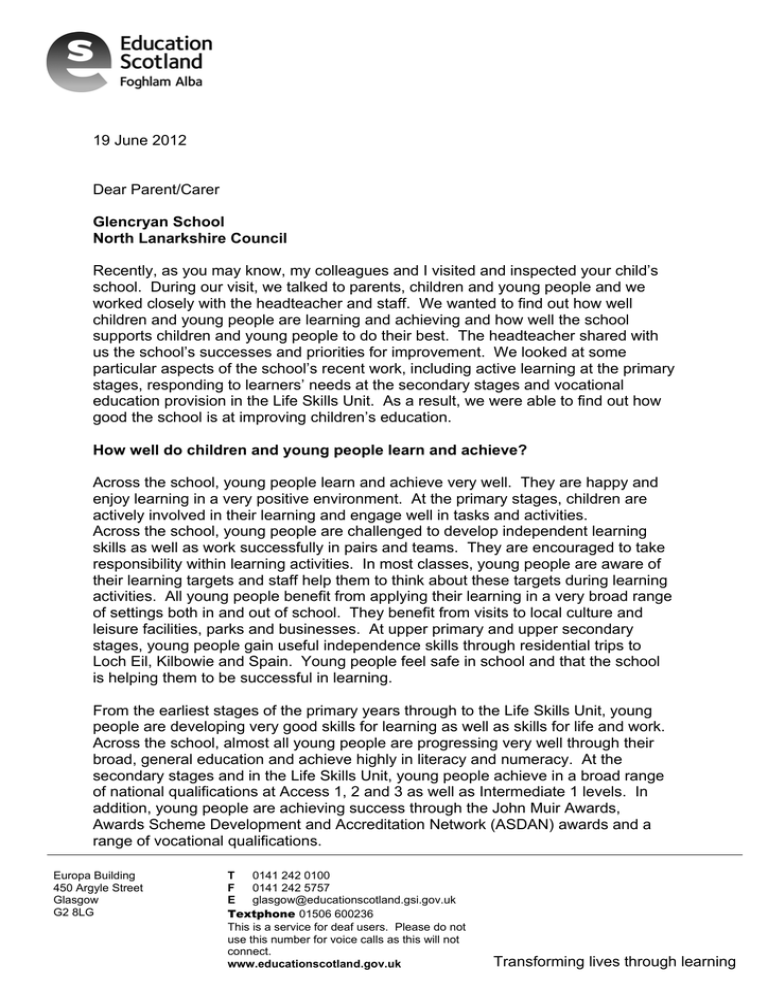
19 June 2012 Dear Parent/Carer Glencryan School North Lanarkshire Council Recently, as you may know, my colleagues and I visited and inspected your child’s school. During our visit, we talked to parents, children and young people and we worked closely with the headteacher and staff. We wanted to find out how well children and young people are learning and achieving and how well the school supports children and young people to do their best. The headteacher shared with us the school’s successes and priorities for improvement. We looked at some particular aspects of the school’s recent work, including active learning at the primary stages, responding to learners’ needs at the secondary stages and vocational education provision in the Life Skills Unit. As a result, we were able to find out how good the school is at improving children’s education. How well do children and young people learn and achieve? Across the school, young people learn and achieve very well. They are happy and enjoy learning in a very positive environment. At the primary stages, children are actively involved in their learning and engage well in tasks and activities. Across the school, young people are challenged to develop independent learning skills as well as work successfully in pairs and teams. They are encouraged to take responsibility within learning activities. In most classes, young people are aware of their learning targets and staff help them to think about these targets during learning activities. All young people benefit from applying their learning in a very broad range of settings both in and out of school. They benefit from visits to local culture and leisure facilities, parks and businesses. At upper primary and upper secondary stages, young people gain useful independence skills through residential trips to Loch Eil, Kilbowie and Spain. Young people feel safe in school and that the school is helping them to be successful in learning. From the earliest stages of the primary years through to the Life Skills Unit, young people are developing very good skills for learning as well as skills for life and work. Across the school, almost all young people are progressing very well through their broad, general education and achieve highly in literacy and numeracy. At the secondary stages and in the Life Skills Unit, young people achieve in a broad range of national qualifications at Access 1, 2 and 3 as well as Intermediate 1 levels. In addition, young people are achieving success through the John Muir Awards, Awards Scheme Development and Accreditation Network (ASDAN) awards and a range of vocational qualifications. Europa Building 450 Argyle Street Glasgow G2 8LG T 0141 242 0100 F 0141 242 5757 E glasgow@educationscotland.gsi.gov.uk Textphone 01506 600236 This is a service for deaf users. Please do not use this number for voice calls as this will not connect. www.educationscotland.gov.uk Transforming lives through learning How well does the school support children and young people to develop and learn? The school provides very effective support to young people to help them develop and learn. At the primary stages, children benefit from well-planned learning experiences in literacy and numeracy. Staff now have clear plans to develop further their approaches to health and wellbeing and other aspects of the curriculum. At the secondary stages, most staff take very good account of learners’ needs when planning learning. They plan learning well using the experiences and outcomes of Curriculum for Excellence. Staff need to ensure that all learning is planned to the same high standard across the school. In the Life Skills Unit, learning experiences linked to the world of work are outstanding. Across the school, almost all staff are skilled at ensuring learning tasks are very well matched to young people’s needs. Additional support needs assistants also provide high quality support to young people. The school has very strong links with a broad range of partners to support learning including health professionals, further education and local businesses. How well does the school improve the quality of its work? The school is very good at improving the quality of its work. Senior managers and staff have a high commitment to continuing professional development and improvement. School improvement activities are clearly linked to achieving the school’s aim of providing every child and young person with high quality experiences that enable them to learn skills for life. The headteacher’s very strong leadership, ably supported by senior managers, ensures that improvement is driven by shared values and consistently high expectations. Young people and parents are fully involved in identifying the school’s strengths and areas for improvement. Across the school, staff at all levels take responsibility for improving the quality of learning and ensuring that young people leave school equipped with very good skills for life and work. This inspection of your school found the following key strengths. • • • • • Happy, confident young people who are enthusiastic about their learning and benefit from very strong relationships with staff. High quality learning which is helping young people make very good progress. Young people’s achievements in literacy, language and communication across the school. Outstanding vocational experiences which contribute to positive destinations for all young people. The leadership of the headteacher, ably supported by the senior management team who ensure that strong values of achievement and success for all permeate the school. We discussed with staff and the education authority how they might continue to improve the school. This is what we agreed with them. • Continue to develop the curriculum including a coherent senior phase. 2 What happens at the end of the inspection? We are satisfied with the overall quality of provision. We are confident that the school’s self-evaluation processes are leading to improvements. As a result, we will make no further visits in connection with this inspection. The local authority will inform parents about the school’s progress as part of the authority’s arrangements for reporting to parents on the quality of its schools. Douglas Hutchison HM Inspector Additional inspection evidence, such as details of the quality indicator evaluations, for your school can be found on the Education Scotland website at http://www.educationscotland.gov.uk/inspectionandreview/reports/school/primsec/Gl encryanSchoolNorthLanarkshire.asp. Please contact us if you want to know how to get the report in a different format, for example, in a translation. You can contact us at enquiries@educationscotland.gsi.gov.uk or write to us at BMCT, Education Scotland, Denholm House, Almondvale Business Park, Almondvale Way, Livingston EH54 6GA. If you want to give us feedback or make a complaint about our work, please contact 01506 600200, or write to us at the above address or e-mail: feedback@educationscotland.gsi.gov.uk. 3
